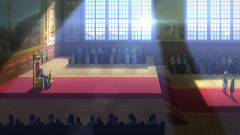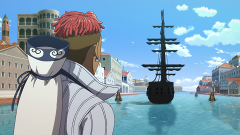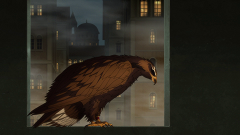The conflict between realism and idealism became clearer than ever on this week’s Altair, with the show using precisely those terms to describe its own thematic underpinnings. Perhaps it’s due to the contrast with Kiros’ brash personality, but I thought Mahmut demonstrated some real patience and political savviness during his time in Venedik. He certainly came closer to camping with the realists than ever before, despite being known to Doge Lucio as “the Pasha who despises war.” That such a title would be a clear identifier tells us all we need to know about the strangeness of Mahmut’s allergy to conflict, at least in this world of uprisings and betrayals. As he continues to meet new people and encounter different perspectives, perhaps he’ll earn a more flattering reputation. “The Pasha who formerly despised war, but now understands that sometimes countries must fight to protect their own interests,” perhaps?
Mahmut is actually a Binbashu now, rather than a Pasha, which is a demotion I’d nearly forgotten until Doge Lucio made sure to mention it during their face-off. Lucio’s explanation for his betrayal of Phoinike is a technical one: Venedik deployed a fleet, as the treaty between the two nations required, but because it said nothing about the ships’ arrival, they were free to remain at sea while the Empire invaded and conquered their former ally. Mahmut bristles at this deception, and at the Doge’s willingness to form a new trade agreement with Balt-Rhein, but Lucio insists that going to war with the Empire wouldn’t have benefitted his people. As the two young men began to answer questions with questions, it became clear that their opinions regarding the political landscape of Centro were irreconcilable. Thankfully, this wasn’t another instance of Mahmut taking a hard-line stance and getting BTFO immediately afterwards – he later admitted to Kiros that his opponent’s views were justifiable, even if they left a bad taste in his mouth. I’d say that’s a good bit of progress, considering how slowly the game of international relations is mastered.
The rest of the episode deals with a plan, orchestrated by Captain Brega and a spice merchant named Mora, to frame Abiriga (who we met last week) for a crime he didn’t commit, thus exiling him from Venedik and freeing him to travel with Mahmut. I was surprised to learn that Abiriga wasn’t a member of Suleyman Bey’s spy network, though it wasn’t a shock to learn that Bey had tried to recruit him years earlier, given his status as an outsider. Abiriga’s refusal stemmed in part from loyalty to his adoptive country, whose citizens hold him in high regard; Brega calls him “highly trusted and accomplished,” which made me doubt the necessity of the cloak and dagger routine. If Venedik wants a good relationship with Turkiye, and Abiriga has the support of the people, why not make him an official emissary? Keeping it a secret allowed the conspirators to test Mahmut’s character (he passed, in a manner so silly that it doesn’t bear recounting), and to keep from “attracting unwanted attention,” but the whole thing felt like an M. Night Shyamalan film to me. The real goal must be to keep the Empire in the dark regarding a potential Turkiye/Venedik alliance, but Kiros has concerns of his own – with Abiriga being likely to pass information back home during their voyage, how much longer will Mahmut and company be able to travel undetected?




